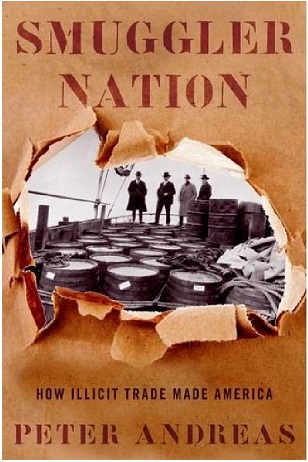Smuggler Nation takes on the notion that the United States has been strictly a law-abiding nation when it comes to imports. In fact, Peter Andreas, the author, argues that rogue trading practices and empires have played a vital role in the US economy since before the Revolution of 1776.
As such, the book offers a new lens through which to see the US role in globalization. As the publisher, Oxford University Press, notes: the book “Counters today’s overly alarmist accounts of borders as under siege and illicit globalization as out of control.”
The following is an excerpt from the introduction to Smuggler Nation: How Illicit Trade Made America:
The agents moved in to seize the illicit shipment, but the traffickers turned on them, shooting the senior officer and torching his vehicle. With the local courts hopelessly compromised and corrupt, the out- raged authorities wanted to extradite the perpetrators of the brazen crime. But this only made them more defiant and violent, and they were never caught or prosecuted.
This may sound like Tijuana or Juarez in recent years, or Medellín not so long ago. But the year was 1772, and the place was near my adopted hometown of Providence, Rhode Island. The ringleader of the attack, John Brown – a prominent local merchant whose business interests included smuggling, privateering, and slave trading – was one of the founders of the university that bears his name (and that hap- pens to be my employer). The famous incident came to be known as the Gaspee Affair, in which a British customs vessel, the HMS Gaspee, was stormed, looted, and torched late at night by an armed group of local citizens in retaliation for cracking down on their illicit trade. The tiny colonial outpost had long been a notorious smuggling hub, greatly advantaged by the geography of Narragansett Bay.
Today, this historical episode is so celebrated by local residents that they put on an annual festival, Gaspee Days, and proudly point to it as Rhode Island’s opening salvo in sparking the American Revolution.
A plaque on South Main Street near downtown Providence, a short walk from where I live, commemorates the event. Gaspee Street is also a few blocks away. Of course, most Americans no longer have such a sanguine view of illicit trade, and U.S. officials, like the frustrated British imperial authorities before them, are increasingly preoccupied with fighting it.
In this book I reexamine the history of America as a battle over smuggling, from evading tariffs and embargoes to violating prohibitions and immigration controls. Focusing on the smuggling of goods and people, the book tells the story of how these illicit flows – and the campaigns to police them – defined and shaped the nation. As we’ll see, smuggling has been a major force in the broader historical evolution of America: as a distant colonial outpost in the British empire (heavily involved in smuggling untaxed goods); as a developing nation partly based on slavery (including illicit slave trading) and clandestine importation of British machines and skilled workers; as an advanced capitalist indus- trial and agricultural economy built on the influx of migrant labor (legal and illegal); and as a highly urbanized economy and society increasingly geared toward personal consumption and pleasure (including smuggled porn, bootlegged booze, prohibited drugs, and pirated music). At the same time, battling these illicit trades has been a powerful motor in the development and expansion of the federal government, greatly extending its policing power at home and abroad.
An underlying dynamic I highlight throughout this book is how the state makes smuggling (through laws and their enforcement), and how smuggling in turn remakes the state. But this is not to imply a simple, mechanical interaction. There is nothing natural or automatic about it. Throughout American history we see the full range of state interactions with smuggling, from collusion and toleration to discouragement and condemnation. This is why politics is such a vital part of the story. After all, deciding which activities are labeled as smuggling in the first place is inherently political, and this has varied enormously across time and place. So too has the intensity, form, and focus of anti-smuggling efforts – drugs such as cocaine and cannabis, for example, were not even law enforcement concerns until the last century.
Reprinted from Smuggler Nation by Peter Andreas with permission from Oxford University Press USA. Copyright © 2013 by Peter Andreas.
Join us in defending the truth before it’s too late
The future of independent journalism is uncertain, and the consequences of losing it are too grave to ignore. We have hours left to raise the $12,0000 still needed to ensure Truthout remains safe, strong, and free. Every dollar raised goes directly toward the costs of producing news you can trust.
Please give what you can — because by supporting us with a tax-deductible donation, you’re not just preserving a source of news, you’re helping to safeguard what’s left of our democracy.
